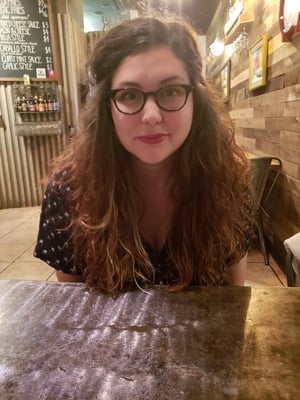Toni did not always want to be a social worker. In fact, her dream was not realized until she left New York City to return home to Waco, TX. Through an inspiring number of twists and turns, new jobs and challenging situations, she was eventually led to social work. She is preparing to graduate with her Master's in Social Work and cannot imagine a more fulfilling profession.
We sat down with Toni to learn more about her journey to social work, and why she chose to switch to this rewarding career. Read on to hear what she had to say about making a career change!
 Tell us a little about yourself. What did you study in undergrad?
Tell us a little about yourself. What did you study in undergrad?
I am originally from Nashville, TN. I moved from TX when I was 2. I attended Baylor University for theater design in undergrad. After graduating with my B.F.A. in Theater Design I landed work immediately in New York. I worked for various Off-Broadway theaters as a Freelance Audio Technician for almost 2 years. However, a little while after I moved, I started dating my now husband who was still in Texas. I feel so incredibly grateful for the opportunity to go and do exactly what I wanted, to live and work in NYC. However, he has two kiddos and we wanted to be together, so I moved back to Waco.
Why did you choose to switch to a degree in social work?
My journey to social work really began when I moved back from NYC and began working as a civil law paralegal for a local Waco firm. Making the decision to come back to Texas was hard, but it was the best decision I have ever made because it led me to social work.
As a civil paralegal, I assisted the attorney in cases involving divorce, suit-affecting parent-child relationship, termination, CPS, adoptions, and much more. I was interacting with a lot of social workers requesting parental-supervisors so the parents could have access to their children or facilitating home-visits to ensure the quality of the house was livable/suitable for children.
I would really hate it when a case was over and the family dynamic, relationships or homes were broken, new or changed — and that’s where our work stopped. I hated it. I always wanted to follow up but knew that wasn’t a part of our job. I hated the idea of leaving a family in this situation and not providing them with resources or continuing support.
My boss gave me the idea to return to school. He suggested law school (no way) or social work. My knowledge of social work at that point didn’t even scratch the surface, so I went to a Preview Day at the Garland School of Social Work and knew this was exactly where I needed to be. Now, here I am, a month and a half away from graduation.
Did you encounter any challenges or fears when deciding to switch to a career in social work?
Because I had switched careers a couple of times from a theater practitioner to retail to paralegal to a case manager for life insurance policies, I wasn’t afraid of the actual shift. I was ready to land on a life-long career. I was most nervous about being a student again. My last year of college I was burnt-out and would sometimes set an unrealistic high standard for myself. With four career changes over a four-year period, I wanted to prove something to myself, but over time I have learned to give myself space for grace. It’s something we have to encourage our clients to do and I have learned to do the same with myself.
How did you hear about the MSW program at Baylor and what attracted you to this program?
I heard about the MSW program at Baylor through another attorney in my office. He had a friend in the program and they both spoke very highly of it. I began doing my research online, made contact with the Student, Career and Alumni Services Office, and went to Preview Day.
In a mock-classroom experience, Professor Jennifer Dickey lead a discussion about humility and culture. This quenched a thirst I had for the type of conversations needed to help our communities and society. We also discussed what it takes to be healthy practitioners and prevent burnout. I learned that social work is such a diverse field and there is flexibility in the work. Preview Day really marketed the quality of the program, explained clear expectations, and showed from day one they care about us as future practitioners.
Was social work an easy field to transition into? Why?
Yes and no. The program is rigorous and difficult, which matches the profession. Social workers walk alongside people going through truly some of the hardest times in their life. But, at the same time, that is what is most honoring and humbling about this profession — that someone allows us in to help them. Our professors walk alongside us in the program and model grace, challenge our illusion of work and ambivalence, and teach us healthy ways to be a successful practitioner.
The other thing that I would encourage anyone to hear as they change careers or start a new program, is that you possess transferable skills. Let me say it again, you have skills that can be transferred from one profession to another. For me, it has been a puzzle figuring out where I gleaned certain knowledge and skills. I realize that throughout my life I have collected a large number of skills from every job and program I have attended.
What are your career dreams or plans? How has the MSW program at Baylor helped prepare you for your future?
First and foremost, I will pass my licensure exam to become an LMSW, then in the near future, I would like to gain employment. I understand that my first job may not be my dream job but rather a stepping-stone to something great. I would also like to become an LCSW, assist Planned Parenthood in developing a social work program in the future, and become EMDR certified.
Baylor's MSW program has helped me connect to future employment opportunities in many ways. The program provided a training course in EMDR and upon graduation I will immediately enter the workforce as a trained practitioner who can use this psychotherapy tool to help treat adults and children. The Garland School of Social Work also connects students and professionals to continuing education opportunities facilitated by our faculty and partners within the community. Most importantly, Baylor’s MSW first-time licensure passing rate is 95%. The program provides licensure prep resources, such as ASWB workbooks, practice exams, and a workshop to help us prepare for the exam.
In your opinion, why is earning your MSW degree a valuable part of your professional journey?
There is no doubt in my mind this is exactly the profession for me and earning an MSW has opened up doors to so many areas of practice. There’s micro level practice, mezzo, macro, and within each of these areas, there are numerous opportunities to work with various populations addressing social justice issues and opportunities for social change. This field is so diverse and the need is great!
If you are like Toni and looking to change careers, consider switching to social work. With diverse and meaningful employment opportunities, and the opportunity to make a real difference in the world — social work may be the perfect fit for you!














